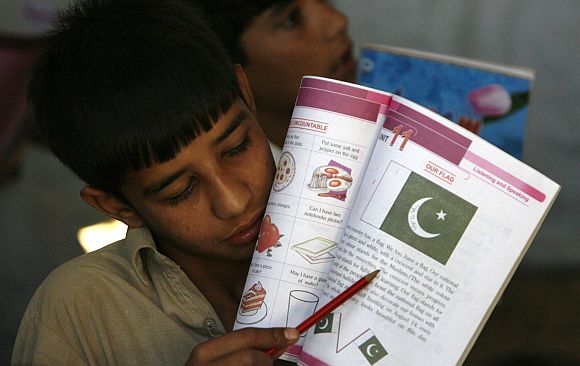Raheel Joseph of Sargodha is a BS Physics student. From primary school to university, he has been studying the subject of Islam like his Muslim classmates, while the Department of Education introduced the subject of ethics instead of Islam for Christians and other non-Muslim students.
Raheel says that when he was studying in fifth grade, his Islamic teacher invited him to accept Islam, but he remained silent.
He says that other students like him belonging to the Christian community in the school were also asked by the teachers to accept Islam.
Twenty-five-year-old Raheel has worked for several national and international human rights organizations and is currently a brand ambassador for a government program.
He explains that the reason for studying Islamiat is that he could not find a teacher teaching ethics as an alternative subject in any institution and he was afraid that by insisting on not studying Islamiat he would become a target of discrimination.
The subject of ethics was added to the curriculum in 2007. Before this, the government of General Zia-ul-Haq had made the subject of Islam compulsory till graduation in the education policy introduced in 1979. After this, the students of the religious minorities were forced to read this article.
The difficulty of these students increased further in 2022 when in the second phase of the single national curriculum policy, the subject of translation of the Quran was also included for intermediate students, while the practice of teaching the subject of ethics to non-Muslim students. Actions were negligible.

In the policy, students studying Ethics were given the option to skip the translation of the Quran exam, and a policy was made to give them extra marks over the marks obtained in the Ethics subject to make up the difference in marks.
However, due to the lack of provision for teaching ethics in educational institutions, the scores of minority students are very low in this subject, and as a result, the additional marks they get as substitutes for translation of the Qur’an are equally low.
20-year-old Jameel from Sargodha is a BS Chemistry student at a private university in the city. He received his early education in a private Christian school where he had the opportunity to study Christian religious beliefs (Catechism) instead of Islam.
He says that all Christian students do not get the opportunity to study in such schools, so they are forced to take the subject of Islam in government institutions because there is no teacher of ethics there.
Karmal Salim, an MPhil social work student and a teacher at a private school, confirms that he was given the option of taking ethics in class 11, but he only studied Islamiat because he was taught ethics in school.
Teachers were not available so he used to study Islamiat and therefore took up the same subject in college.
Karmal says that in schools and colleges where the subject of ethics is offered, its classes are nominal.
“Usually there is no separate department or teacher for ethics so students have to study on their own, due to which their marks are very low”.

According to the 2017 census, the population of the Christian community in Sargodha is 66,000. In 2018, 1837 non-Muslim students took the exam in Sargodha Board, out of which only 429 i.e. 23% chose the subject of ethics while the remaining 77% took the Islamiat exam.
The information obtained from Punjab’s social information system ‘SIS Punjab’ shows that there is no teacher vacancy for teaching ethics subject in educational institutions of Sargodha.
District Education Office officials say that the government has not made any policy to recruit ethics teachers.
To fill this gap, a teacher of Islamic Studies or Arts is assigned the temporary responsibility of teaching this subject.
If one examines the advertisements published for the posts of college lecturers in this, a Christian religious leader who runs a church and school in Sargodha, believes that forcing students from religious minorities to study Islam at a young age is tantamount to taking away their religious identity and freedom.
“Such students are not aware of the sensitivity of the content of religious books, so there is a fear of being charged with blasphemy against them for any inadvertent mistake”.
Father Thomas also expresses dissatisfaction with the ethics curriculum. He says that in this article, instead of promoting universal moral principles, mostly Islamic moral concepts have been propagated and the morals and values of other religions have not been adequately represented. last ten years, there is no mention of ethics teachers.

Father Thomas, a Christian religious leader who runs a church and school in Sargodha, believes that forcing students from religious minorities to study Islam at a young age is tantamount to taking away their religious identity and freedom.
“Such students are not aware of the sensitivity of the content of religious books, so there is a fear of being charged with blasphemy against them for any inadvertent mistake”.
Father Thomas also expresses dissatisfaction with the ethics curriculum. He says that in this article, instead of promoting universal moral principles, mostly Islamic moral concepts have been propagated and the morals and values of other religions have not been adequately represented.
They suggest that the ethics curriculum should be improved and used to promote interfaith harmony and should be made compulsory for Muslim students to help end the climate of intolerance in society.
